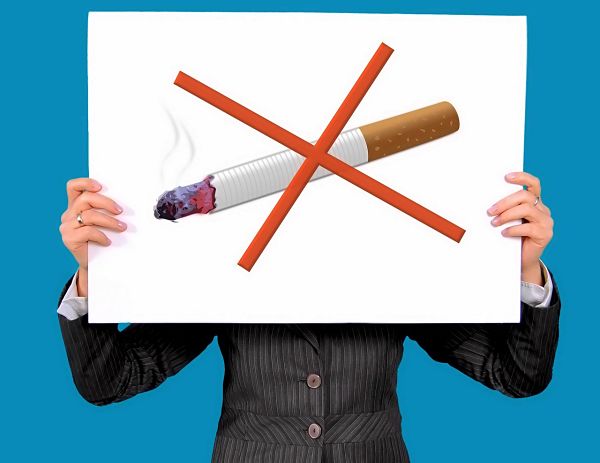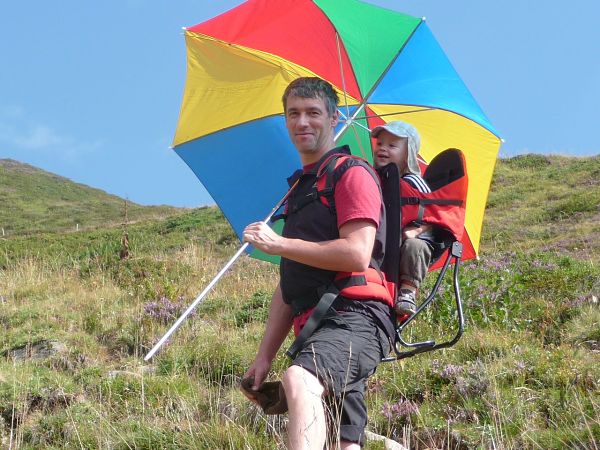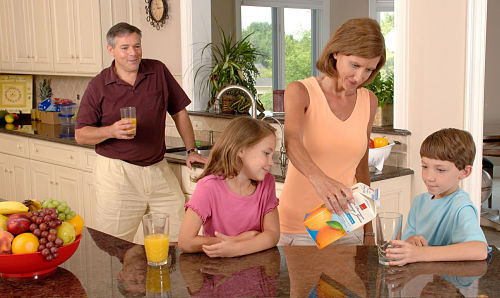|

Back to School the Healthy Way
It's hard to believe that it's already August! Summer is coming to an end and the school year is right around the corner. But before you send your kiddos to the bus stop, make sure they're starting this school year off in a healthy way.
There are many risk factors for cancer that we have the power to control, and each of them involves the choices we make in our daily lives. Living a healthy lifestyle is the most important thing you can do to prevent cancer, and the easiest way to do so is by developing healthy habits early on. If you help your children adopt healthy lifestyle habits now, it will reduce their risk of getting cancer when they're older. See below for a list of things you can do to reduce your children's risk of getting cancer later in their life.
Teach your kids to stay away from tobacco.
- Why it's important:
- Ninety percent of smokers started smoking before they turned 18.
- Smoking will cause the premature death of one out of every 13 kids currently alive in the U.S.
- Tobacco use is responsible for nearly a third of all cancer deaths.
- Tobacco use is known to cause the following cancers: cancer of the bladder, cervix, colon, esophagus, kidney, larynx, liver, lung, mouth, pancreas, rectum, stomach and throat. It can also cause acute myeloid leukemia.
- Chewing tobacco causes oral cancer, which is one of the deadliest types of cancers.
- E-Cigarettes (electronic cigarettes) are not safe. According to the American Lung Association, "Initial studies show that e-cigarettes contain nicotine and also may add in other harmful chemicals, including carcinogens and lung irritants."
- What you can do:
- Talk to your kids about the facts listed above.
- Show them how expensive cigarettes are.
 Teach them to be sun-safe. Teach them to be sun-safe.
- Why it's important:
- According to the Cleveland Clinic, "Eighty percent of a person's lifetime sun exposure is acquired before age 18."
- Twenty percent of people in the U.S. will develop skin cancer at some point in their life.
- What you can do:
- Talk to your kids about the facts listed above.
- Read our article on the steps you and your kids can take to be sun-safe.
Get them vaccinated against the human papillomavirus (HPV).
- Why it's important:
- High-risk HPVs can cause anal cancer, cervical cancer, oropharyngeal cancers, penile cancers, vaginal cancers and vulvar cancers.
- According to the Centers for Disease Control (CDC), the "HPV vaccine works very well. A recent study by the CDC showed that the HPV vaccine is very effective and helped to cut HPV infection rates in teen girls in half."
- If you still need convincing, read the American Cancer Society's list of HPV vaccine facts and fears.
- What you can do:
- Talk to your kids about the facts listed above.
- Take your kids (girls AND boys) to get the first HPV vaccine in the 3-shot series when they are 11 or 12.
- Are your children older than 12? The HPV vaccine is recommended for girls who are 13 to 26 and boys who are 13 to 21.
Help them maintain a healthy weight.
- Why it's important:
- A third of all U.S. children are either overweight or obese.
- Every year, a third of all cancer deaths in the U.S. are related to poor diet and lack of physical activity.
- According to the American Cancer Society, there is solid evidence that links being overweight or obese with an increased risk of the following cancers: breast, colon, endometrium, esophagus, kidney, pancreas and rectum.
- What you can do:
- Talk to your kids about the facts listed above.
- Focus your family meals around plant foods. The American Institute for Cancer Research (AICR) "recommends filling at least 2/3 of your plate with vegetables, fruit, whole grains and beans."
- Help them get protein from plants rather than red meat or processed meats.
- Motivate them to be physically active for at least one hour every day.

The most effective way of reducing your children's cancer risk is to set a good example. If you exhibit healthy lifestyle habits, your kids will most likely lead healthy lives, too.
|
|
|